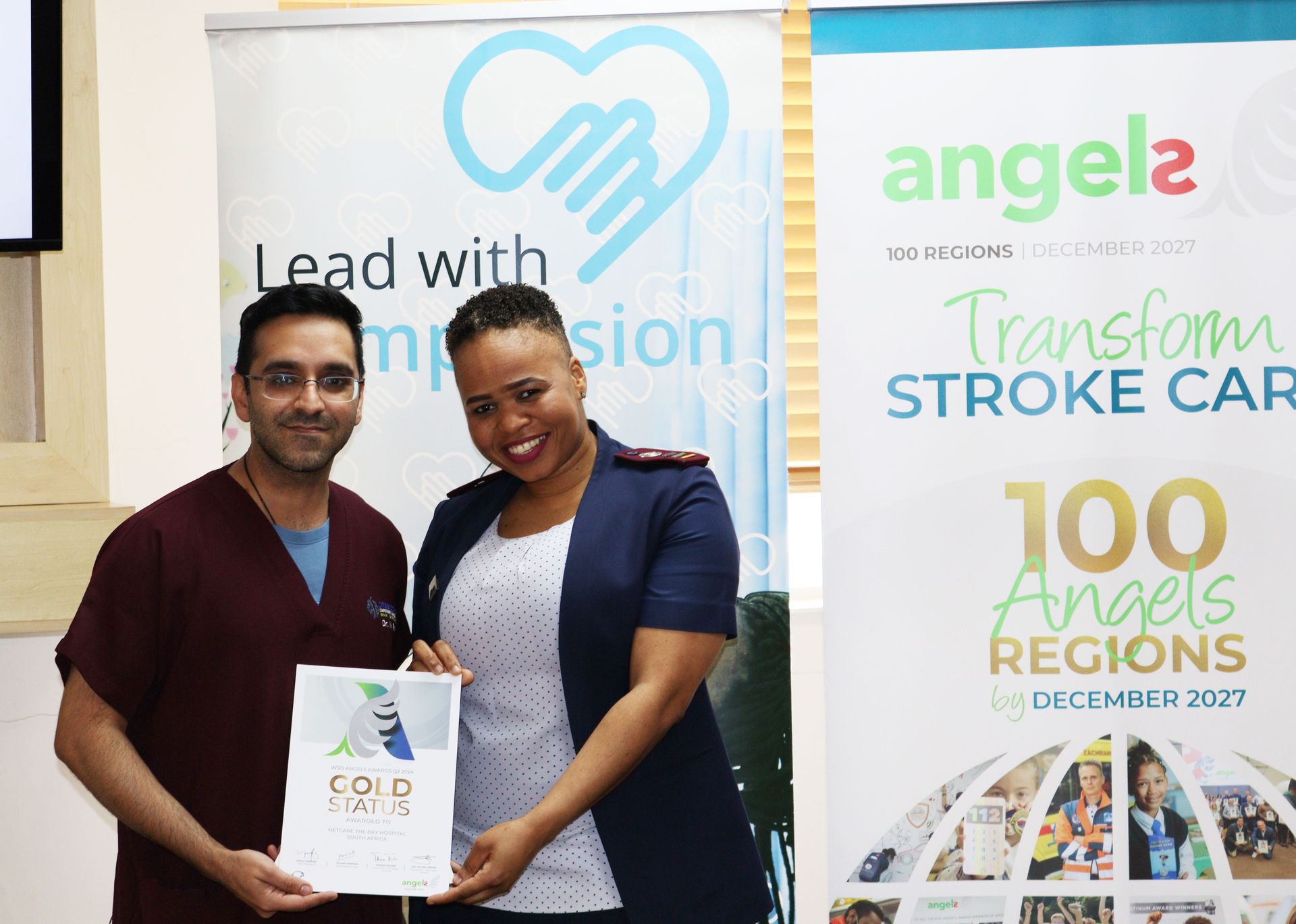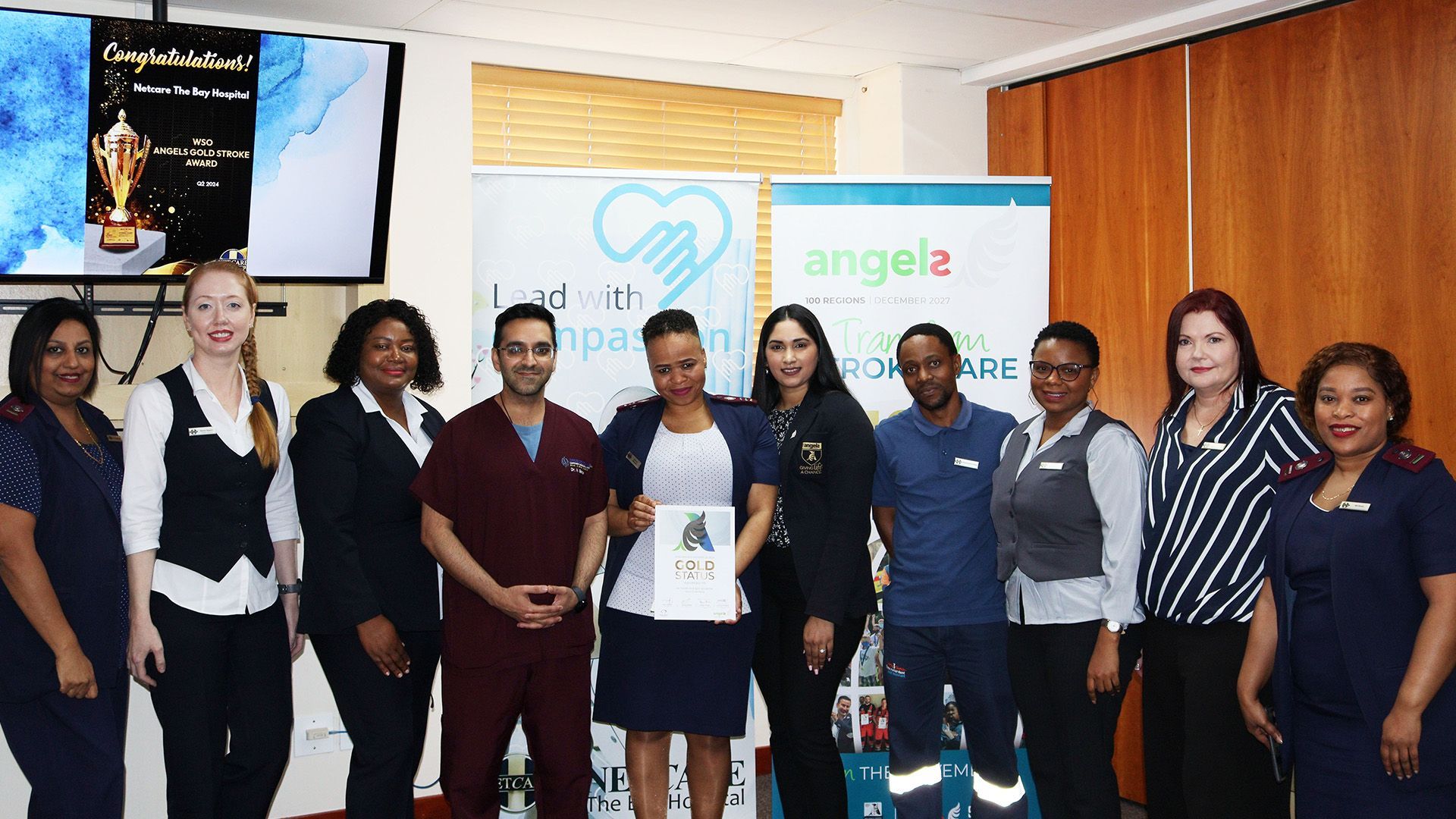‘Time is brain’ - Golden window critical for treatment of strokes
Netcare The Bay Hospital was recently recognised for excellence in stroke care by the World Stroke Organization and Angels Initiative. From left to right are Kasturi Yagambaram (deputy nursing manager), Marna Basson (pharmacy manager), Luleka Mhlauli (nursing manager), Dr Naazim Siddi Ganie (neurologist), Sr Nomvula Mthembu (unit manager of the emergency department), Maxeen Murugan (KZN Angels initiative consultant), Phiwokuhle Sapula (acting technical manager), Slindile Hlongwane (HR manager), Susana Redelinghuys (financial manager) and Nkosingiphile Biyela (deputy nursing manager).
Hospital’s excellence in stroke care recognised by World Stroke Organization and Angels Initiative
Within minutes of a stroke occurring, brain cells begin to die. This critical neurological damage means that time is of the utmost essence for the patient.
Specialist neurologist at Netcare The Bay Hospital, Dr Naazim Siddi Ganie, elaborates on the gravity of the situation: “When the blood supply to the affected part of the brain is interrupted or reduced, brain tissue can no longer get the oxygen and nutrients it needs. This makes a stroke a medical emergency that requires prompt treatment. The mantra ‘Time is brain’ underscores a crucial reality: within minutes of a stroke occurring, brain cells begin to die, making rapid medical intervention paramount.”
This urgency is a defining factor in the treatment protocols at Netcare The Bay Hospital in Richards Bay, which recently received the prestigious Gold Award from the World Stroke Organization (WSO) and the Angels Initiative for its excellence in stroke care.
Dr Ganie explains that having a stroke remains one of the leading causes of disability and death worldwide: “In South Africa, the challenge is even more pressing, especially in underserved areas like Richards Bay and other areas of Northern KwaZulu-Natal.”
According to the World Stroke Organization (WSO) Angels Initiative, worldwide, every 30 minutes, a person who suffers a stroke and could have been saved either passes away or suffers a lifechanging brain injury because they weren’t treated in a hospital that follows the internationally recognised criteria in stroke management. “This underscores the importance of access to such facilities and adds to the team's pride at Netcare The Bay Hospital for our recent Gold Award by the Angels Group,” says Dr Ganie.
The award recognises the hospital's outstanding achievements in optimising stroke care and achieving exceptional patient outcomes. “By implementing a highly coordinated and optimised stroke care pathway, the hospital has improved early stroke recognition, ensuring that patients receive the care they need within the critical time frame.”

Specialist neurologist at Netcare The Bay Hospital, Dr Naazim Siddi Ganie and Sr Nomvula Mthembu, unit manager of the emergency department at Netcare The Bay Hospital with the prestigious Gold Award from the World Stroke Organization (WSO) and the Angels Initiative, which was recently awarded to the hospital for excellence in stroke care.
Can strokes be prevented?
Dr Ganie explains that following a healthy lifestyle may prevent most strokes. He recommends maintaining a healthy weight, exercising regularly, reducing stress levels, limiting alcohol intake and quitting cigarettes if you’re a smoker. “It is also imperative to manage conditions like high blood pressure, atrial fibrillation (a type of abnormal heart rhythm), diabetes, and high cholesterol”, he adds.
However, some strokes are caused by unavoidable factors. “Ageing contributes to an increased risk of stroke. Women, unfortunately, have an increased risk of stroke after menopause. In addition, family history also plays a role. Genetic conditions like familial high blood pressure and cholesterol or clotting disorders, for example, also increase the risk of a stroke.”
What are the different types of strokes?
Dr Ganie explains that around 85% of all strokes are ischaemic strokes caused by a blood clot. They occur when a major blood vessel in the brain is blocked, either by a blood clot or by a build-up of fatty deposits and cholesterol known as plaque.
“A haemorrhagic stroke occurs when a blood vessel in the brain bursts, flooding nearby tissue with blood. This causes pressure and irritation to the delicate brain tissue.”
Dr Ganie stresses that a transient ischemic attack (TIA) – which is when blood flow to part of the brain is reduced by a clot or fatty deposit – can result in symptoms similar to a stroke but that the damage is not permanent.
There is cause for optimism for stroke patients
According to Dr Ganie, Netcare The Bay Hospital offers cutting edge treatments for stroke patients, including thrombolytic therapy, which dissolves blood clots and restores blood flow to the brain. They also facilitate mechanical thrombectomies, a minimally invasive procedure to remove clots from large arteries. “Both treatments have been shown to significantly reduce disability and improve survival rates when administered promptly.”
The optimisation of stroke care at Netcare The Bay Hospital doesn't stop at acute treatment, with Dr Ganie and his team ensuring patients receive a comprehensive rehabilitation programme designed to help them regain as much function as possible to reintegrate into their communities.
“This holistic approach acknowledges that while acute intervention is critical, long-term recovery is just as important. After discharge, stroke survivors are connected with physiotherapists, speech therapists, and occupational therapists to help them recover lost abilities and improve their quality of life. The hospital also provides ongoing support through regular follow-up appointments, ensuring patients receive continuous care throughout their recovery journey.”
The hospital's stroke team works closely with local paramedics, equipping them with the knowledge and tools needed to quickly recognise and act on suspected stroke cases. Dr Ganie says this pre-hospital coordination means the team is prepared even before the patient arrives, ensuring that precious minutes are saved. “Once the patient is in the emergency department, the team jumps into action with a clearly defined protocol that minimises delays in diagnostic imaging and treatment decisions.”
Education is key
“An easy way to remember the signs of a stroke is to use the acronym FAST. This stands for Face drooping, Arm weakness, Speech difficulty and Time to call emergency services.”
Dr Ganie says this is important because many patients get to healthcare facilities too late. “If they’d arrived earlier, they could benefit from treatments such as thrombolysis or mechanical thrombectomy, both of which can dramatically improve outcomes if administered within the golden window.”
About the award
Netcare The Bay Hospital general manager Deon Smith says the hospital has made considerable strides in stroke management under the leadership of Dr Ganie. “Having the prestigious Gold Award from the Angels Group among our accolades means we’ve become the only hospital in Northern KwaZulu-Natal to achieve such recognition. This accomplishment reflects the programme's profound impact on improving acute stroke care.”
The Angels Initiative is dedicated to improving stroke patients’ chances of survival and a disability-free life. In eight years, around 7,5 million patients have been treated at over 6 000 Angels hospitals worldwide.
“This award is a testament to the success of the hospital's stroke management initiative and reflects its commitment to providing world-class care in an area where such services are desperately needed,” adds Smith.
Zasskia Wiese, Netcare’s national stroke programme manager, explains that to qualify for the award, all hospitals recognised by the WSO Angels Initiative must register with and submit data to the Registry of Stroke Care Quality (RES-Q), an initiative of the European Stroke Organisation’s Enhancing and Accelerating Stroke Treatment (EAST) protocols.
This registry allows for international benchmarking and continuous improvement and monitoring to ensure consistency of quality stroke care. “We are committed to the highest standards of care for our stroke patients, which shows our efforts are recognised globally. We’re honoured by this prestigious award, which cements our dedication to continuous improvement in stroke care and assures our patients that we’re a beacon of hope in Northern KwaZulu-Natal,” she says.


We use cookies to ensure that we give you the best experience on our website. To learn more, visit our Privacy Page.











